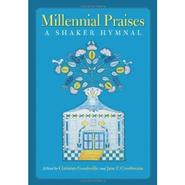
In 1774, a small but determined religious group left Manchester, England, for America, just before the Revolution. Although grounded deeply in Christianity, their beliefs were so revolutionary and passionate that they were called Shakers by surrounding communities. That is, their fervor and unusual customs shook the earth.
At the center of Shaker thought is equality and simplicity. They seek to eliminate all that is unnecessary and sinful, especially with regard to sexual intimacy. In fact, celibacy is a major theme in the religion. Shakers are also ardent pacifists, separatists, and advocates of equal rights for all people, regardless of race or gender. They lived in communal housing and emphasized virginity and purity in everyday life.
Jane Crosthwaite, professor of religious studies at Mount Holyoke College, and Christian Goodwillie, curator of special collections and archives at Hamilton’s own Burke Library, presented a lecture about Shaker hymns and their significance to the religion on Nov. 15. The lecture was based on their book, Millennial Praises: A Shaker Hymnal, and was this year’s Couper Phi Beta Kappa Library Lecture. While Crosthwaite played an instrumental role in analyzing the written lyrics, Goodwillie assembled the melodies and converted their sheet music to a form that is more easily read in modern notation.
According to Crosthwaite, the Shakers believe that their religion cannot be conformed to one particular body of hymns or practices. Rather, enlightenment is a “continuing revelation of god” that takes place over many generations. For this reason, they are wary of the written word. By writing down lyrics and objectives, they feel that they are robbing the ideology of space in which it can develop further. Despite this, in 1810 the Shakers began releasing their hymns in a set of four publications which was completed in 1813. The final collection contained 140 hymns, many of which were written by Richard McNemar. McNemar was very influential to Shaker development. After converting and bringing with him much of his former congregation, McNemar helped significantly with the musical aspect of Shaker tradition.
Indeed, music was of very high importance to the Shakers. They were known to participate in long sessions of singing and dancing. Shakers considered dance to be a form of “humility and mortification” before god, and singing was central to their prayers. In the beginning, the dance forms were quite wild, earning the Shakers ridicule from outsiders. As the religion became more organized, however, the dancing also began to resemble more of a line dance, which could be rehearsed in preparation for the ritual.
While the hymnal proves to be an invaluable source of lyrics, finding the tunes to the songs was challenging. Goodwillie researched these tunes for years, ultimately finding melodies to accompany nearly every hymn in the book. After converting the musical notation he found to a more modern, universal system, the notes to the hymns were published along with the words in Millennial Praises. As Crosthwaite pointed out vital phrases and analysis of the verses, Goodwillie sang selected sections in the original melodies, allowing the audience to literally hear the hymns as the Shakers would have during prayers.
The hymns are more than just beautiful songs to hear or a useful tool for dancing. The lyrics are a poetic reflection of the entire ideology of the Shakers. Celibacy in particular is a common topic. According to Shaker thought, Adam and Eve tainted themselves in the eyes of god by engaging in sexual activity, placing them among the animals. By this logic, the only way to avoid this primal and grave sin is to avoid sex altogether. As a result, the hymns frequently honor virgins. The very first hymn of the collection, “Testimony of Eternal Truth,” praises those who are “Now from a carnal nature freed.” The meaning behind this line suggests that only those who are celibate can be true vessels for god’s word.
The Shakers are, above all else, fully committed to their principles. Their way of life is a struggle, though everything they do is directed toward god. Their hymns are a passionate and elegant way of carrying across their ideals of purity and their unwavering faith. Crosthwaite and Goodwillie conveyed this passion and faith through in-depth discussion, careful analysis, and, of course, the universal beauty of song.
Posted November 16, 2010
